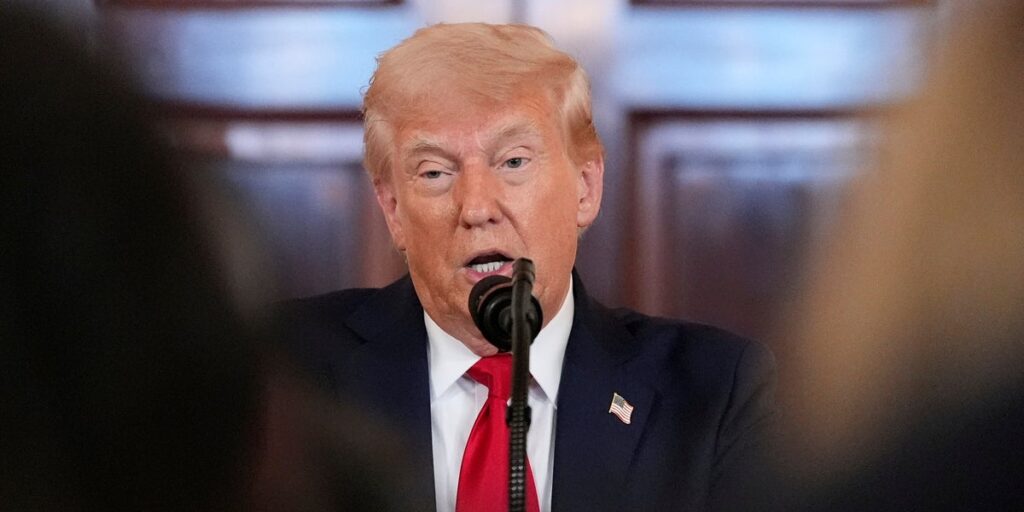WASHINGTON — Unhappy that his trade war appears to be running the strong economy he inherited into a ditch, President Donald Trump is selling Americans a fantasy version of his first 100 days in office in which everything is going just great.
“I think it’s the most consequential 100 days in the history of our country,” he said in a White House speech Wednesday afternoon, repeating a theme from earlier in the day.
“We’ve just completed what many consider to be the most successful first 100 days of any administration in the history of our country,” Trump declared at his Cabinet meeting, just hours after the Commerce Department reported that the U.S. economy had actually shrunk in the first three months of the year, a strong sign of an impending recession. “Things are happening that are amazing.”
Trump’s agency heads and top aides ― whom he appointed and whom he can fire in an instant — chimed in to agree.
“Mr. President, your first 100 days has far exceeded that of any other presidency in this country. Ever. Ever,” said Attorney General Pam Bondi. “Never seen anything like it. Thank you.”
President Donald Trump speaks with his Cabinet after reports that the U.S. economy contracted 0.3% in the first quarter of 2025, fueled by a massive surge in imports ahead of the administration’s expected tariffs. Andrew Harnik via Getty Images
Trump continues to claim that the tariffs he imposed on imports would make the country rich while failing to point out that U.S. importers pay that tax, not exporting nations and companies.
In an interview with ABC News broadcast Tuesday night, Trump turned tourism statistics — which are showing a drop-off in foreign visitors to the United States ― on their head. “Tourism is way up,” he said. “Tourism is doing very well.”
And when faced with metrics too well-known to be refuted with casual falsehoods, Trump has used a favorite deflection: blamingpredecessor Joe Biden.
Trump has long been eager to take credit for the stock market’s rise, and did so repeatedly after his November election win.
“Everyone is calling it the — I don’t want to say this. It’s too braggadocious, but we’ll say it anyway — the Trump effect,” he said on Jan. 19, the day before he retook office.
Since then, markets fell with the prospect of Trump’s coming trade warand then further tumbled after Trump’s April 2 announcement of tariffs on all foreign countries. They are now down about 7% since the start of his term, and Trump has since changed his story to disclaim any responsibility. “This is Biden’s Stock Market, not Trump’s. I didn’t take over until January 20th,” he wrote, and then implored his fans: “BE PATIENT!!!”
One of Trump’s clear successes is in reducing the number of migrants trying to cross into the United States from Mexico to near zero —although how much of this is due to tougher enforcement and how much is due to Trump turning the U.S. into a place that those seeking freedom and opportunity no longer wish to enter is unclear.
Even that accomplishment, though, has been offset by the public’s lack of support for Trump’s eagerness to round up migrants and deport them without a court hearing, even sending hundreds or thousands of them to a notorious Salvadoran prison with no prospect of release.
Indeed, the border and immigration remain Trump’s best issues in recent polling, and even on those, he is barely above 50% support, as irritation about his failure to lower costs as he repeatedly promised he would during his campaign and concern about economic conditions getting worse have sent his approval ratings spiraling downward.
Trump’s overall approval rating, which started at over 50% in late January, is now in the mid-40s, with his approval on handling inflation in the upper 30s.
During a disjointed and meandering 90-minute speech Tuesday night in which he meant to take a victory lap for all his accomplishments thus far, Trump falsely accused the news media of publishing inaccurate polls to make him look bad.
“They say Trump only has a 44% approval rating. Well, it’s actually not bad. But when you figure that, if it were a legit poll, it would be in the 60s or 70s,” he told an audience of a few thousand attending his rally in Warren, Michigan.
Nevertheless, Trump seems keenly aware that his trade war, particularly his 145% import tax rate against Chinese goods, is likely to create shortages while simultaneously increasing prices. In an unusual statement Wednesday, he seemed to boost anti-consumerism while inadvertently acknowledging that American importers and consumers are the ones who pay tariffs, not foreign nations and exporters.
“Somebody said, oh, the shelves are going to be open,” he said at his Cabinet meeting. “Well, maybe the children will have two dolls instead of 30 dolls, you know, and maybe the two dolls will cost a couple of bucks more than they would normally.”
Related…
Read the full article here


